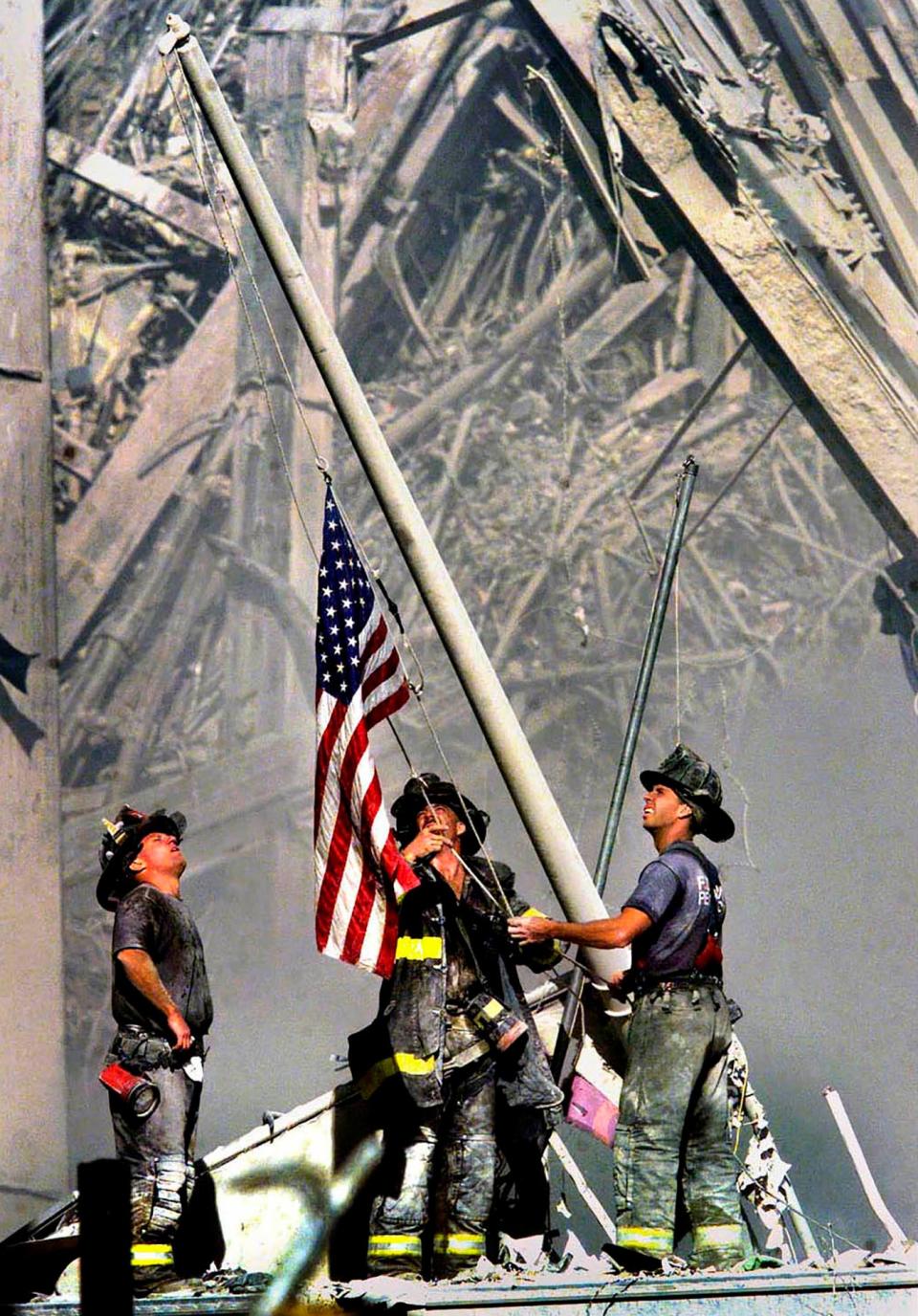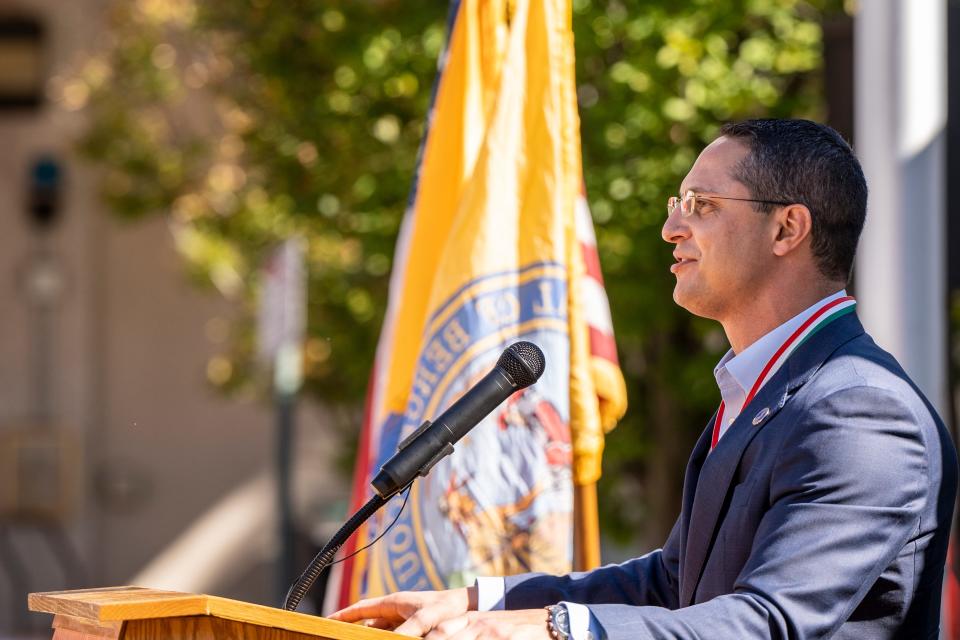NJ lawmakers move to guarantee health care access for 9/11, Ground Zero survivors
- Oops!Something went wrong.Please try again later.
A new bill would ensure that all New Jersey public safety workers who spent time at Ground Zero after the Sept. 11 attacks will remain able to get needed health care.
The legislation, sponsored by state Sen. Joseph Lagana and state Senate President Nick Scutari, would provide workers’ compensation benefits to public safety employees who experienced any illness or injury or died as a result of their participation in response to the Sept. 11, 2001, attack on the World Trade Center. The legislation moved forward Thursday from the state Senate Labor Committee, which Lagana chairs.
How will the program benefit NJ 9/11 survivors?
If the bill becomes law, affected public safety workers and their families could file disability claims through the New Jersey Department of Labor and Workforce Development. Claimants would be required to note important details — such as how their health has been affected and if and when they have received aid from the World Trade Center Health Program — within two years of the bill's effective date. In addition, claimants can note whether they have a permanent disability from exposure at the World Trade Center or within the area of exposure recognized by the World Trade Center Health Program.

Enrollment in the World Trade Center Health Program is required to benefit from the new bill, but those receiving workers’ compensation payments from another state or from a federal program are not eligible.
The program provides health care to those directly affected by the terrorist attacks, including medical monitoring and treatment for emergency responders, recovery and cleanup workers, and volunteers who helped at the World Trade Center, the Pentagon and the crash site near Shanksville, Pennsylvania, as well as initial screenings and treatment for those who were present on the day of the attacks or who worked, lived or went to school in the New York City disaster area on Sept. 11, 2001, or the months that followed.
It was established by the James Zadroga 9/11 Health and Compensation Act of 2010 and reauthorized five years later to run until 2090.
9/11 victim's mom: Victims of mass violence need sustained support
What did officials say?
Lagana said the bill will ultimately assist about 250 people, mostly from North Jersey, but that he feels they should be entitled to these benefits because it is a job-related injury “even if it happens years later.”
“Hopefully these illnesses become less and less, but I think it’s our job and our obligation to make sure that they’re given any benefit that they deserve,” Lagana said.
He also said legislators wanted to work with other providers who manage benefits for 9/11 survivors and their families.

Lagana said he is working with the governor’s office to “make sure the bill in practice actually works,” because “we don’t want people to find out years later that they were able to tap into it and they couldn’t.”
There were some technical concerns about the cost of providing these benefits to municipalities, but Lagana noted that there will be continued conversations as the bill progresses through the Legislature.
Effects of attacks still grow
Though more than 22 years have passed since the attacks, there are more than 125,000 people enrolled in the WTC Health Program — and that number keeps growing.
The Centers for Disease Control and Prevention breaks down enrollment into two categories: responders and survivors. The former includes emergency responders, recovery and cleanup workers, and volunteers at all of the attack sites, and the latter means those at the scene of the attacks or who worked, lived or went to school in the New York City disaster area on Sept. 11 or in the months after.
In September 2018, there were 72,950 responders and 17,546 survivors enrolled. By September 2023, when the most recent data became available, those numbers had grown to 86,481 and 40,945, respectively.
Mike Kelly: The deaths of Richard Henderson and Joseph Zadroga were tragic. What can we learn?
The fumes and dust that covered lower Manhattan in the days and weeks that followed the attacks are believed to be the cause of various illness, including cancers, for those who lived and worked in the area.
Nearly 18,000 World Trade Center first responders have been diagnosed with cancer and at least 1,650 have died from the disease, according to the CDC.
But it’s not just cancer that people have to contend with. Illnesses range from chronic rhinosinusitis and asthma to sleep apnea and gastroesophageal reflux disease. More than 10,000 first responders have been diagnosed with post-traumatic stress disorder.
John Feal, a former Ground Zero construction worker who founded the Feal Good Foundation to draw attention to the growing health problems linked to 9/11, thinks of the bill as a win for first responders because “any piece of legislation that's passed is always a victory for us, and we don't get many victories.”
“These pieces of legislation are Band-Aids on a machine gun, and while they're not helping 100%, at least they're helping,” he said.
Feal also noted that the average age of the 9/11 first responder was 38½, and now those same people are on average 60 or 61 years old. He said they are facing the weakening of their immune systems and are being diagnosed with serious illnesses.
And he said those who were there should “take advantage of what's owed to you and advocate for others to get what you got.”
Katie Sobko covers the New Jersey Statehouse. Email: sobko@northjersey.com
This article originally appeared on NorthJersey.com: NJ moves to guarantee health care access for 9/11 survivors

